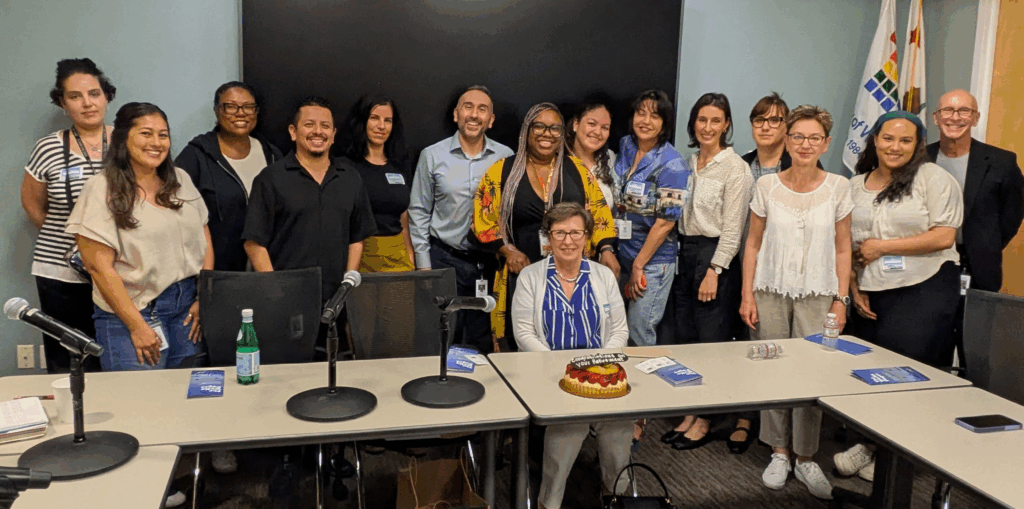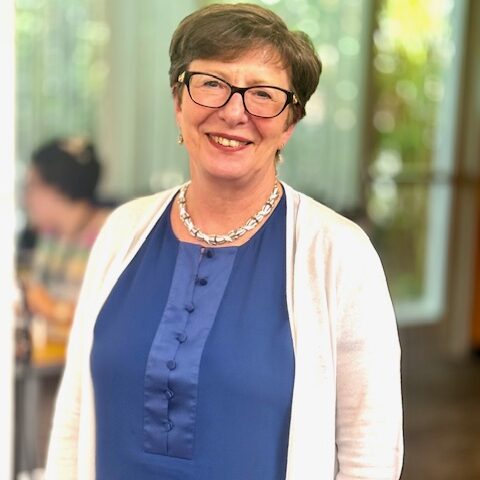Where Leadership Meets Compassion

In the heart of West Hollywood, a quiet revolution in community care has unfolded over the past three decades—one rooted in a powerful partnership between the City of West Hollywood and Jewish Family Service LA (JFSLA). At the center of that story is Marina Berkman, longtime program director at the West Hollywood Comprehensive Service Center (WHCSC). Her leadership has been instrumental in sustaining West Hollywood’s role as a model for inclusive, community-centered care and social innovation.
Founded in the mid-1980s shortly after West Hollywood became an incorporated city, the West Hollywood Comprehensive Service Center was built on a shared mission: to help residents age safely, healthfully, and with dignity in their own homes.
When Marina immigrated to Los Angeles from Estonia in 1991, she was fluent in Russian, held a master’s degree in psychology from the Soviet Union, and possessed a desire to help people. One year later, she began working part-time at the WHCSC on behalf of Jewish Family Service LA, supporting fellow Russian-speaking immigrants. “I was fresh off the boat,” Marina recalls. “I knew I had to start over—not just for myself, but to continue the work I believed in.”
Thirty-three years later, Marina is preparing to retire as JFSLA Program Director of the West Hollywood Comprehensive Service Center, a role she has held for two decades. In that time, she helped transform a small, city-funded program into a nationally recognized model for compassionate, community-based care.
Founded in the mid-1980s shortly after West Hollywood became an incorporated city, the West Hollywood Comprehensive Service Center was built on a shared mission: to help residents age safely, healthfully, and with dignity in their own homes. With funding from the city, JFSLA became the primary provider of social services and community connection working in the center.
While Marina focused on key initiatives, WHCSC/JFSLA’s services grew over the years to include the following life-saving programs:
The Connect Program, a program that matches isolated older adults with trained volunteers for long-term companionship. The program has won national awards and continues to be a hallmark of compassionate innovation.
Specialized Case Management and Mental Health Support, including social workers who are trained to work with vulnerable residents—such as those struggling with hoarding disorder or untreated mental illness—who require deep, trust-based interventions to access help.
City-Funded Home Care Services and cleaning services for residents caught in the middle—they don’t qualify for state help, but cannot afford care on their own.
Food Assistance that includes a senior meal site, plus culturally tailored referrals to programs like JFSLA’s SOVA Food pantries and Pop-ups, and Seeds of Hope.
Psychiatric Consultations and Emergency Alert support for clients without insurance, ensuring that even the most complex medical and mental health needs don’t go unaddressed.
Multilingual Support is available across eight languages, including Russian, Spanish, Hebrew, and Armenian, reflecting West Hollywood’s richly diverse community.
These programs are more than a list of services—they are the result of sustained, intentional collaboration between JFSLA and a uniquely responsive city government.
The City of West Hollywood has made social services a cornerstone of its identity, working closely with nonprofit partners to fill gaps in care, develop new initiatives, and respond quickly to community needs. Every year, city administrators audit services, ask questions, and invest in improvement—not just maintenance.
“That’s what’s so extraordinary,” says Marina. “The City of West Hollywood counts on us to spotlight unmet needs and underserved groups, and collaborates with us to bridge those gaps.”
From emergency grocery gift cards to on-site case management at subsidized housing buildings, to daily kosher meals served just steps from the center’s office—West Hollywood’s investments have created a continuum of care that is rare in cities of any size. And in doing so, they have set an example.
“Marina’s commitment to the city is inspiring. She has helped so many residents, especially seniors and people living with disabilities,” said John Heilman, West Hollywood’s Vice Mayor who has worked alongside Marina for over twenty years. “Her compassionate attitude makes everyone feel that she is their advocate and their friend.”

“The goal was always dignity. Aging in place, being seen, feeling safe. That’s what we’ve done here. And I am very proud of it.”
Marina Berkman, WHCSC Program Director
Marina plans to return to private practice as a psychotherapist after retiring. But the systems she helped build—grounded in relationship, equity, and care—will continue shaping lives long after she steps away.
In Marina’s hands, and in the city’s vision, West Hollywood became more than a place—it became a promise. A promise that people would not be forgotten. That needs would not be ignored. That care would be delivered with skill, heart, and humanity.
With deep gratitude, we honor Marina’s remarkable career and lasting contributions to West Hollywood. Her spirit lives on in every act of care that follows.